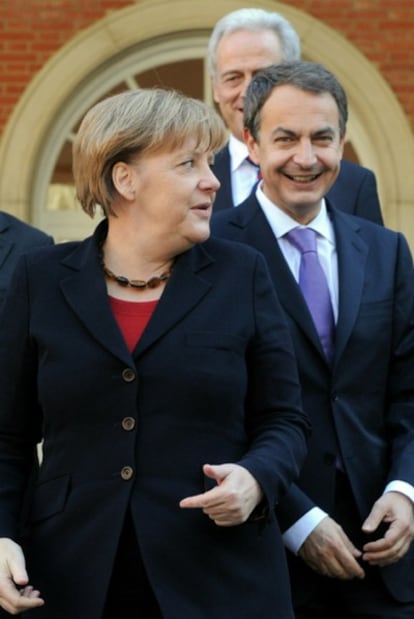Merkel: "Spain has done its homework and is on a good path"
German chancellor praises Spanish economic reforms at Madrid summit
The recent economic reforms put in place by the Spanish government received the backing of German Chancellor Angela Merkel during her visit to the Hispano-German summit in Madrid on Thursday.
"Spain has done its homework and is on a very good path," the German leader remarked in a joint press conference with Spanish Prime Minister José Luis Rodríguez Zapatero. "Spain has done great things; great achievements and steadfast reforms that are allowing a change of direction for Spain," she said, going on to praise the measures agreed with labor unions and employers in the broad social and economic pact signed on Wednesday.
According to Moncloa sources, the German leader showed she was convinced by Prime Minister Zapatero's explanations of the reorganization of the Spanish financial system and that "confidence has been recovered" in the Spanish economy and the euro.
The chancellor also used the Madrid visit to stress the necessity of passing the "competitiveness plan" to be presented to the European Council in March, which would mean the increasing of the 750 billion-euro European stabilization fund, as well as making it more flexible to allow, for example, the most vulnerable countries to re-buy bonds in the secondary market and alleviate pressure on their debt.
The plan, which has been negotiated with French president Nicolas Sarkozy, includes measures already adopted by Spain such as the pushing back of the retirement age to 67, as well as new proposals such as the disassociation of salary increases from inflation, and a legal or even constitutional ban on incurring a budget deficit, as has already been applied in Germany.
Zapatero, who has given his support to Merkel's project, said the euro occupied a large proportion of this morning's bilateral discussions. "The euro zone is [Europe's] most ambitious political and economic project," affirmed the Spanish prime minister. "The euro is strong but we are going to strengthen the common currency even more."
Spain's labor leaders, meanwhile, took no time in rejecting Chancellor Merkel's proposal that salaries should be linked to the growth of benefits and not to inflation. In a joint press conference with the president of Germany's principal labor union, DGB, CCOO leader Ignacio Fernández Toxo and the UGT's Cándido Méndez explained it would be an error if Spanish salaries stopped being linked to the consumer price index and were only linked to productivity.
Merkel's day began with a visit to the Zarzuela Palace to be received by King Juan Carlos, who greeted her in English and joked about her punctuality as the German leader had arrived several minutes early for their meeting.
Although the chancellor's Madrid visit only lasted six hours, it didn't stop Prime Minister Zapatero from calling it "the most important between Spain and Germany in recent years." Among the participants were six ministers from both countries, as well as key labor and business leaders.

Tu suscripción se está usando en otro dispositivo
¿Quieres añadir otro usuario a tu suscripción?
Si continúas leyendo en este dispositivo, no se podrá leer en el otro.
FlechaTu suscripción se está usando en otro dispositivo y solo puedes acceder a EL PAÍS desde un dispositivo a la vez.
Si quieres compartir tu cuenta, cambia tu suscripción a la modalidad Premium, así podrás añadir otro usuario. Cada uno accederá con su propia cuenta de email, lo que os permitirá personalizar vuestra experiencia en EL PAÍS.
¿Tienes una suscripción de empresa? Accede aquí para contratar más cuentas.
En el caso de no saber quién está usando tu cuenta, te recomendamos cambiar tu contraseña aquí.
Si decides continuar compartiendo tu cuenta, este mensaje se mostrará en tu dispositivo y en el de la otra persona que está usando tu cuenta de forma indefinida, afectando a tu experiencia de lectura. Puedes consultar aquí los términos y condiciones de la suscripción digital.








































